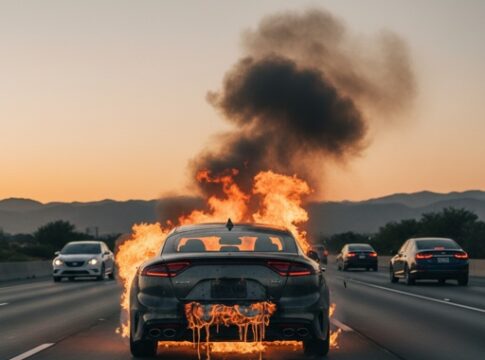All Americans must check their cars, as a quarter-million Kia sedan owners now face a terrifying reality: their fuel tanks could literally melt while they drive, prompting a massive and dangerous recall.
When Your Daily Driver Becomes a Fire Hazard
The National Highway Traffic Safety Administration discovered a defect that sounds like something from a disaster movie. Faulty fuel tank valves in Kia K5 sedans become damaged during normal operation, creating openings that allow air to seep into sealed fuel systems. This contamination causes fuel tanks to expand beyond their design limits, creating conditions where the tank material could fail catastrophically.
The recall spans four consecutive model years, from 2021 through 2024, indicating this wasn’t an isolated manufacturing hiccup. Either Kia’s quality control systems failed repeatedly, or a fundamental design flaw escaped detection across multiple production cycles. Both scenarios raise serious questions about the company’s commitment to basic safety standards.
🚨 Newz Alert 🚨 " Kia Recalls 250,000 K5 Sedans – Fuel Tanks Can Melt & Catch Fire "
➡️ Kia is recalling approximately 250,000 K5 sedans from model years 2021-2024 due to a defective fuel tank inlet check valve
➡️ The faulty valve allows excess air into the tank, causing it… pic.twitter.com/pHHJE3bfBn— BreakinNewz (@BreakinNewz01) November 20, 2025
The Engineering Nightmare Behind Melting Fuel Tanks
Fuel systems operate under precise engineering tolerances for good reason. When air infiltrates a sealed fuel tank, it disrupts the delicate pressure balance that keeps gasoline contained safely. The expanding tank material is under stress levels it was never designed to withstand, potentially leading to cracks, leaks, or complete structural failure.
This type of defect is among the most dangerous automotive failures. Unlike brake problems or steering issues that manifest gradually, fuel system failures can escalate from minor inconvenience to life-threatening emergency within seconds. The potential for fire or explosion makes this recall particularly urgent for affected vehicle owners.
Corporate Accountability Meets Federal Oversight
NHTSA’s intervention demonstrates the critical role federal regulators play in protecting consumers when manufacturers fall short. The agency possesses authority to mandate recalls, impose substantial penalties, and pursue criminal charges if companies deliberately conceal safety defects. This recall likely resulted from pattern analysis of consumer complaints and incident reports that revealed the widespread nature of the problem.
Kia now faces significant financial exposure beyond immediate repair costs. The company must notify 250,000 vehicle owners, coordinate with dealerships nationwide, and potentially defend against class-action lawsuits from affected consumers. The broader reputational damage could impact sales across Kia’s entire product line, as consumers question whether similar defects exist in other models.
What This Means for Your Driving Safety
Vehicle owners should treat recall notices with the same urgency as medical emergencies. Continuing to drive a vehicle with known fuel system defects creates unnecessary risk for occupants and other motorists. The expanding fuel tank could fail without warning, potentially causing fuel leaks that ignite from engine heat or electrical sparks.
This recall also highlights why consumers should research a manufacturer’s safety records before purchasing vehicles. Companies with patterns of serious recalls often struggle with systemic quality control issues that affect multiple product lines. Smart buyers verify recall histories and choose manufacturers with demonstrated commitments to rigorous safety testing and quality assurance.
Sources:
Kia Recalling Quarter-Million K5 Sedans with Fuel Tanks That Could Melt

